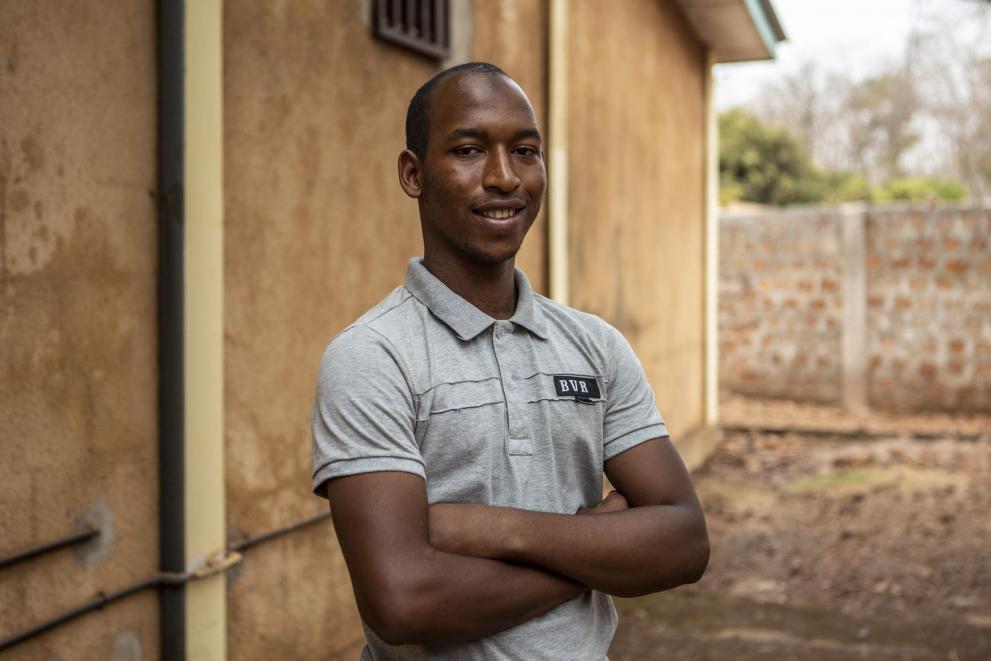Guinea has been going through a fragile and turbulent democratic transition since 2008. Extreme poverty, weak governance, and lack of equal access to basic services and resources are fuelling resentment and mistrust in the State‘s ability to promote positive change for its people. Tensions, conflicts, and violent clashes between different groups, are affecting the country’s fragile stability and resilience. Through the project “Unis dans nos différences,” the IcSP aims to strengthen local actors’ (youth, women, local authorities, religious and traditional leaders) capacities to manage conflicts peacefully and to promote social cohesion and tolerance, while preventing the spread of radicalisation and violent extremism. For a long time, as a teenager, Thierno engaged in acts of violence in the turbulent north of Guinea. Today he urges his peers to follow his path towards peace.

This article is the first in a series of stories on how work financed by the Service for Foreign Policy Instruments directly impacts the lives of individuals. More entries as a part of the “Unis dans nos différences” project will follow over the coming weeks.
Guinea has been going through a fragile and turbulent democratic transition since 2008. Extreme poverty, weak governance, and lack of equal access to basic services and resources are fuelling resentment and mistrust in the State‘s ability to promote positive change for its people. Tensions, conflicts, and violent clashes between different groups, are affecting the country’s fragile stability and resilience.
Through the project “Unis dans nos différences,” the IcSP aims to strengthen local actors’ (youth, women, local authorities, religious and traditional leaders) capacities to manage conflicts peacefully and to promote social cohesion and tolerance, while preventing the spread of radicalisation and violent extremism.
For a long time, as a teenager, Thierno engaged in acts of violence in the turbulent north of Guinea. Today he urges his peers to follow his path towards peace.
Thierno is a 19-year-old from Labé, Guinea, who has already come a long way. The young man would regularly engage in acts of violence during the protests fuelled by political dissent that still affect the town today.
“We would set up barricades, burn tyres and hurl stones at the police until they left. Then, from behind the barricades, we would demand payment from people to let them pass. I would leave home without a penny but return with my pockets full,” Thierno explains.
One day, a childhood friend suggested to Thierno that he should take part in an activity organised by the organisation Search for Common Ground, which aimed to set up a club to promote peace in schools. Reluctantly, the teenager agreed. Once there, something unexpected happened:
“I felt that I was being listened to for the first time. It might seem simple, but that was what triggered a change in me. I was able to get everything off my chest, the things that caused me pain. To listen to someone is to acknowledge them, to make them exist,” he says.
From that moment, Thierno gave up troublemaking and seized the opportunity to follow a new path in life. Day after day, he has been expanding his knowledge and building new friendships. “I eagerly followed the entire training. When I got home, I would go over all the documents on what we had just learned on leadership, conflict transformation, dialogue and tolerance.” Thierno’s enthusiasm did not go unnoticed and he was elected president of the school peace club set up as part of the ‘Unis dans nos différences’ (‘United in our Differences”) project financed by the European Union.
As a part of the peace club, Thierno finds the same place he discovered when he went to his first activity, a place where one is listened to and which is conducive to making change. His new role also enables him to apply his new skills in leading educational conferences on positive communication and youth leadership, among other activities. Furthermore, he has been taking part in setting up a debating project titled “L’école sans violence” (School Without Violence).
“Recently, there was a dispute between a high school (lycée) and a middle school (collège). The situation worsened; stones were hurled and cars damaged, and some people even got hurt. We were able to bring both parties together, listen to them and help them find common ground. It is up to us as pupils to solve these problems before they grow even bigger,” he explains.
Thierno now considers his past far behind him. He is known across town for his commitment to social cohesion and he aspires to be a role model for young people. “The people I used to spend time with had turned me into a violent young man. But now, it is the opposite. Whenever I see my friends, I speak to them about peace and they too have changed,” he says.
This young man’s positive attitude is still very much intact today. The influence he exerts on his peers gives him hope for the future and highlights the essential role Guinean youth have to play in shaping it. “I want to keep the school peace club running beyond the end of the project. Today’s young people are tomorrow’s leaders. If they continue to grow up harbouring this violence inside of them, they will in turn become its instigators. Change is possible for everyone, provided they are given the opportunity,” he concludes.
|
As part of the “Unis dans nos differences” project financed by the Instrument contributing to Stability and Peace (IcSP), 40 peace clubs have been set up in secondary schools, communities, and universities across Guinea. In the town of Labé, the club is led by young leaders trained in conflict transformation, youth leadership, and facilitation techniques. It provides a space where students and other young people can discuss issues relating to the prevention of violent extremism, thereby increasing their resistance (and that of their peers) to incitement to violence and hatred. |
